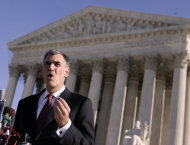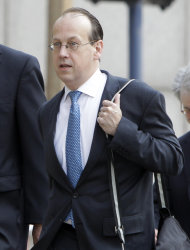POLITICS SLIDESHOWS
U.S. tries 'hip-hop' diplomacy in Pakistan
4 photos - 8 hrs agoHerman Cain's accusers
8 photos - Mon, Nov 7, 2011Rep. Gabrielle Giffords
10 photos - 10 hrs ago
WASHINGTON (AP) — The Supreme Court is ready to consider next year the legality of President Barack Obama's signature domestic legislation, an overhaul of the U.S. health care system.
The law, passed by Congress last year on a largely party-line vote, was the most far-reaching domestic legislation in a generation but has proved a political lightning rod. It is vigorously opposed by all of Obama's prospective Republican opponents in next year's presidential election.
The Supreme Court's schedule set aside more than five hours of argument for the law, unprecedented in modern times. The justices' decision could come before the July 4 Independence Day holiday and is certain to be a focus of campaigning in the run-up to the Nov. 6 elections.
The Patient Protection and Affordable Care Act aims to providehealth insurance to more than 30 million previously uninsured Americans. Republicans have branded the law unconstitutional since before Obama signed it in a ceremony in March 2010.
The court's ruling could be its most significant and political decision since its decision that had the effect of making George W. Bush president in a harrowingly close 2000 presidential election. The justices left themselves an opening to defer the outcome if they should choose, by requesting arguments on one lower court's ruling that a decision must wait until 2015, when one of the law's many provisions takes effect.
Legal experts have offered a range of opinions about what the high court might do. Many prominent Supreme Court lawyers believe the law will be upheld by a lopsided vote, with Republican and Democratic appointees ruling in its favor. Others predict a close outcome, with Justice Anthony Kennedy, a Republican appointee who sometimes joins his four colleagues appointed by Democratic presidents, holding the deciding vote on the nine-member court.
The White House has pushed for the quickest possible decision, and Communications Director Dan Pfeiffer said the administration was pleased the justices agreed to take the case now, with arguments in March. "It's important that we put to rest once and for all the issue of maybe the law will disappear," said Health and Human Services Secretary Kathleen Sebelius.
Republicans also said they were happy the high court would hear arguments on the constitutionality of the provision at the heart of the law and three other questions about the act. The central provision in question is the requirement that individuals buy health insurance starting in 2014 or pay a penalty.
"That the Supreme Court is taking this up, I think, is a positive signal that there are legitimate concerns surrounding the constitutional aspects of mandating that individuals purchase health care insurance and purchase it according to Washington's guidelines," said the majority leader in the House of Representatives, Rep. Eric Cantor of Virginia.
The exceptional 5½ hours allotted for argument demonstrates the significance the justices see in this case. Normally, they allow only one hour, split between two sides. In the modern era, the last time the court increased that time anywhere near this much was in 2003 for consideration of the McCain-Feingold campaign finance overhaul. That case consumed four hours of argument.
This argument may even spread over two days, as the justices rarely hear more than two or three hours a day.
The health care overhaul would achieve its huge expansion of coverage by requiring individuals to buy health insurance starting in 2014, by expanding Medicaid, the government's largest previous health care program and by applying other provisions, many yet to take effect.
Two justices, conservative Clarence Thomas and liberal Elena Kagan, who had been asked by advocacy groups to withdraw from the case, are going to take part in it. The court's practice is for justices who are staying out of a case to say so when it is accepted, and no one has announced a recusal. Thomas's wife, Virginia, has worked for a group that has advocated against the health care overhaul, and Kagan served as solicitor general in the Obama administration when the law was being formulated.









No comments:
Post a Comment